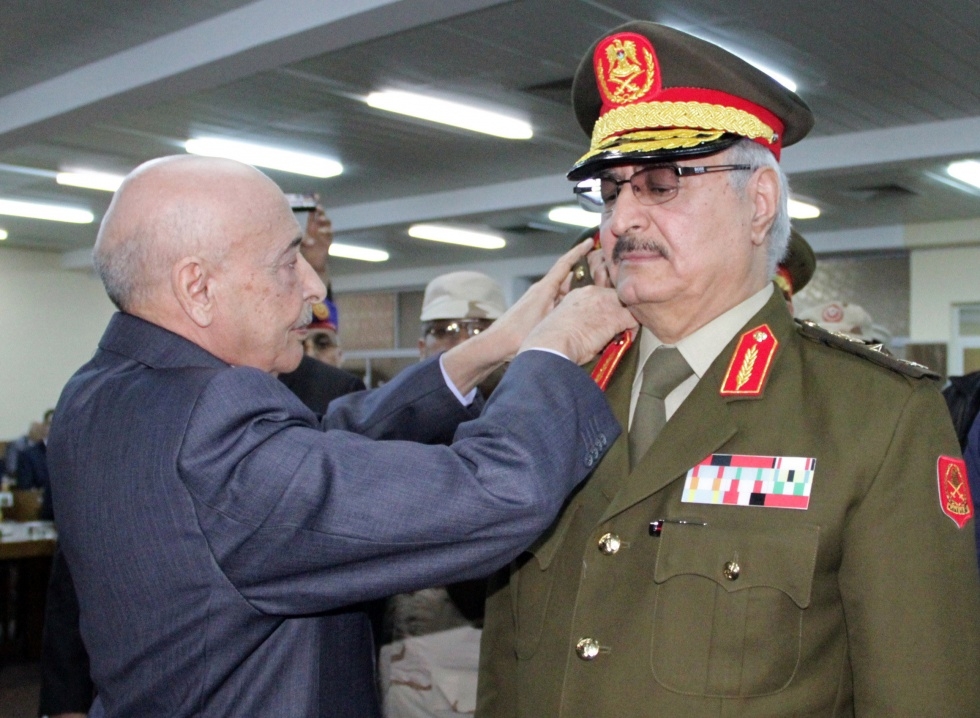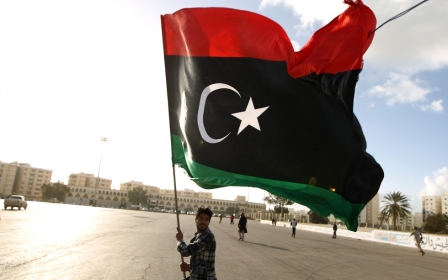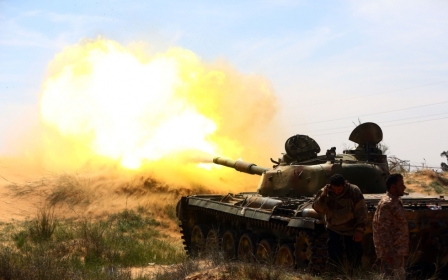Haftar holds the key to peace in Libya

The UN Special Envoy for Libya Bernardino Leon announced this week that the factions he gathered in Morocco could be very close to signing a national unity deal, leading to a consensus government for which names are being discussed. Yet, regardless of the outcome of those talks, the real kingmaker of Libya’s civil war will remain Khalifa Haftar, the man who started it and the only man who can stop it.
For some months now, UN-led negotiations in Libya have moved in parallel with the fighting. The latter track has obviously hampered the former, as different eruptions of violence have from time to time delayed or even blocked the talks brokered by Leon.
This collision between talks and fighting is not an accident but rather part of a deliberate strategy. Nowhere was this clearer than on Friday 20 March, when a military offensive was declared on the same day in which talks were due to resume in Morocco. The eastern-based, internationally recognised government of Abdullah al-Thinni and its “top military commander” Khalifa Haftar stated that the goal of the offensive was to recapture Tripoli.
As part of this onslaught, Tripoli’s only remaining airport of Maitiga was hit. This facility is civilian, although according to a recent UN report, some of the commercial flights coming in from Turkey had been used in the past to smuggle small weapons to the militias now in control of the city.
Prime Minister Thinni had abandoned the capital last summer, in the midst of the fighting between the militias of Zintan - which previously controlled the city - and those coming mostly from Misrata that eventually gained control of Tripoli after destroying its international airport.
Hitting civilian airports is against international law and yet too many “military commanders” have gotten away with it - starting with those responsible for the events of last summer. This occurred despite a specific UN Security Council Resolution (2174) allowed for issuing individual sanctions against those responsible for violating international law and human rights.
Haftar’s sense of impunity in leading successive attacks against Tripoli’s civilian airport is further heightened by a powerful web of international patrons and by the current political situation in Libya.
Ultimately, the Thinni government, sitting in Tobruk, has increasingly come to represent just one side of the civil war. This was particularly evident after the gradual integration with Operation Dignity, launched in May 2014 by Haftar himself with the aim of uprooting Islamists of all stripes from Libya.
In early March of this year, Haftar was appointed top military commander of the armed forces of Tobruk. He has never concealed his opposition to a power-sharing agreement with Islamists, in line with the policy of his main backers Egypt’s President Abdel Fattah al-Sisi and the government of the UAE. Representing the internationally recognised government and with friends like these, Haftar knows that he can pursue his political strategy through military means as much as he likes.
As a matter of fact, fighting in Libya does not always respond to a precise military strategy but it is rather armed propaganda or politics by other means. Haftar’s onslaught on Tripoli was part of a political strategy that aimed at either stopping the talks or tipping the balance of those talks in favour of Tobruk.
Looking at the plan that the UN presented to the parties on Wednesday, he seems to have succeeded. Since last summer, two parliaments claimed legitimacy in Libya: on one hand, the internationally recognised House of Representatives (HoR) sitting in Tobruk and elected on 25 June 2014; on the other hand, the rump General National Congress - Libya’s previous legislature - which reconvened in Tripoli and claims to be the only legitimate body after a Supreme Court verdict on 6 November struck down the constitutional amendment that allowed for the elections of the House of Representatives.
This “clash of legitimacies” seems to have been resolved in favour of the HoR which on UN plan’s point 2 speaks of “The House of Representatives as a legislative body representing all Libyans under the full application of principles of legitimacy and inclusion." Inclusivity has been a problem of the Tobruk parliament from the start: some if its members had not been elected for security reasons while others boycotted it because of its location in Haftar’s heartland, despite the constitution mandated it to be located in Benghazi.
It is not clear whether the parliament will now be moved to a more neutral location but the spreading of the fighting to almost all of Libya’s coastal towns makes this very unlikely. The fact that even the Tripoli parliament seems to have accepted point 2, gives reasons to be optimistic at least on the end of the boycott by many of the MPs in the House of Representatives. But that’s a very small silver lining.
Ultimately, the “consensus government” may not be a solution to the collapse of the country’s government structure. Thinking that the new executive branch will connect with ministries and government agencies in Tripoli is delusional as long as its decision-making remains in Tobruk, hundreds of miles from the capital.
The transfer of both government and parliament to the capital or to Benghazi will be impossible while the fighting goes on. This is unlikely to stop until the parties agree on a less public item which is under discussion in the talks: a “consensus” head of the armed forces to replace Haftar, or at least a consensual civilian commander-in-chief. This is why for as long as Haftar is in charge, he will do everything he can to sabotage a national unity deal that would ultimately unseat him - and strikes on airports like Maitiga are just the starter.
Alternatively, he could accept the creation of a consensus cabinet while at the same time pursuing his military strategy, including the fighting in Tripoli which would make the operability of the cabinet itself quite problematic.
And, after all, who would stop him? The consensus government would not have big forces of its own, unless one includes in the count those hostile to Haftar who would support the unity deal, which means more civil war to come. The foreign patrons of the general and of his opponents may hold the key to this dilemma. Not by chance, a high official in the UN mission to Libya stated that those who launched the recent offensive on Tripoli “have been very clear they don’t want an agreement”.
On the other hand, no one in the West can really count on Haftar’s military rivals. The Libya Dawn coalition has actively fought in the civil war and is in an ambiguous alliance with groups like Ansar al-Sharia, blacklisted by the UN for their terrorist activities. Yet, the political branch of Libya Dawn, the General National Congress, has made significant concessions at the negotiating table as the point on the legitimacy of the House of Representatives demonstrates. Meanwhile, forces from Misrata - the main “shareholder” of Dawn - have fought against IS in Sirte.
If talks are going to be successful and if the consensus government is to be effectively operating from Tripoli, it is up to Haftar to call off the offensive against Tripoli. But this is unlikely to happen while he has such powerful friends in the region – and powerful friends of those friends in Europe, particularly in the Italian and French governments.
- Mattia Toaldo is policy fellow in the Middle East and North Africa Programme at the European Council on Foreign Relations.
The views expressed in this article belong to the author and do not necessarily reflect the editorial policy of Middle East Eye.
Photo: An unidentified Libyan official adjusts a rank to the uniform of Khalifa Haftar (AFP)
New MEE newsletter: Jerusalem Dispatch
Sign up to get the latest insights and analysis on Israel-Palestine, alongside Turkey Unpacked and other MEE newsletters
Middle East Eye delivers independent and unrivalled coverage and analysis of the Middle East, North Africa and beyond. To learn more about republishing this content and the associated fees, please fill out this form. More about MEE can be found here.





